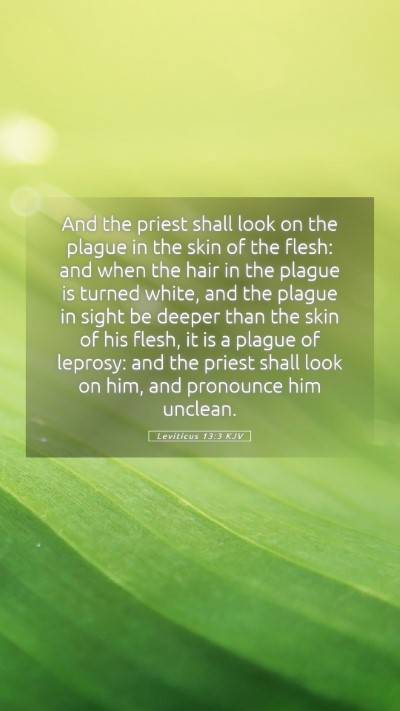Understanding Leviticus 13:3
Bible Verse: Leviticus 13:3
Verse Meaning: Leviticus 13:3 addresses the examination of a person suspected of having a skin disease, a significant aspect of the Old Testament laws regarding purity and health. This verse teaches that a priest must thoroughly inspect the affected skin for signs of leprosy, which was seen as a serious condition during biblical times. The meticulous process illustrated in this scripture provides insight into the importance of physical and spiritual health in Israelite society.
Insights from Public Domain Commentaries
Insights gathered from prominent Bible scholars such as Matthew Henry, Albert Barnes, and Adam Clarke reveal several layers of meaning to this verse:
-
Matthew Henry: Henry emphasizes that the role of the priest as an inspector signifies the seriousness with which the community should treat issues of health and purity. The priest's careful examination underscores the need for discernment in spiritual matters, equating physical ailments to spiritual conditions within the community.
-
Albert Barnes: Barnes elaborates on the implications of the diagnosis by highlighting the role of the priest as a mediator between God and the people. He notes that this process not only reflects community health but also carries spiritual significance, reminding believers that cleanliness and purity before God are paramount.
-
Adam Clarke: Clarke provides a historical context, explaining that leprosy was viewed as a form of divine judgment. He points out that the regulations outlined in Leviticus serve to protect the community by isolating the afflicted, which echoes broader themes of holiness and separation from sin.
Bible Verse Commentary
This verse serves multiple purposes in its broader scriptural context:
-
Health Regulation: The instruction to examine skin diseases indicates the importance of public health and the communal responsibility to care for one another.
-
Spiritual Reflection: The examination can be seen as a metaphor for self-examination of one's spiritual state, challenging individuals to reflect on their relationship with God.
-
Community Impact: Isolation of the afflicted provides insight into how communities dealt with disease, emphasizing the role of leaders (priests) in nurturing both physical and spiritual wellness.
Historical Context
The historical context of Leviticus 13 involves a society that heavily relied on purity laws. The Israelites, as instructed in the Law of Moses, were to be conscious of cleanliness, which was both physical and ceremonial. The sacrificial system interlinked with these laws emphasizes the necessity of a clean heart and life in relationship with God.
Application of the Verse
For modern readers, Leviticus 13:3 can prompt thoughts on personal integrity and accountability within communities:
- Personal Reflection: How does my life reflect the purity and integrity that God desires?
- Community Role: What can I do to support those in need, particularly those struggling with health or spiritual issues?
- Leadership in Faith: How can leaders in the church maintain a healthy community by encouraging holiness and purity among members?
Related Bible Cross References
- Leviticus 14:1-32: Instructions for the cleansing of lepers.
- Numbers 5:2: Command regarding the separation of the unclean.
- Matthew 8:2-3: Jesus' healing of a leper, showcasing compassion and purity.
Conclusion
In conclusion, Leviticus 13:3 serves as more than just a guideline for examining skin diseases; it illustrates broader themes of communal responsibility, spiritual integrity, and the significance of health—both physical and spiritual. Understanding scripture through studies and commentaries like those of Henry, Barnes, and Clarke deepens our appreciation for the intricate connections between health, holiness, and community in the biblical narrative.


